I remember saying to my therapist that I must be doing something wrong. Life felt so hard. Why was I struggling so much? I would have given anything to fit in with the favored crowd — the commendable, worthwhile, socially entitled, who wear success like a loose garment, bedecked with grace and ease. Why couldn’t I just follow my dreams and the latest instructions from Oprah, Dr. Phil or Martha Stewart Living and pull prosperity casually, effortlessly out of my trendy, warm, chunky, soft-stretch, cable-knit beanie? (Like they presumably did.)
Wasn’t that the point of popular media, celebrity talk shows, and mainstream self-help?
For everyone in the know, this kind of flow is regarded as manifest destiny. For the rest of us, there are coping skills. Either way, respectable people do not lose their shit, not for a moment and certainly not for years or decades at a time.
A hard lesson for me to get in my suicidal journey was that my body was having none of this. I kept pointing to the beautiful tri-fold brochure that the culture said my life was supposed to look like. It was such a great message:
Bountiful living is free for the taking. Personalities, careers, and relationships can all look fabulous. All they need is a bit of shaping, conditioning, and polishing. My existence can be as readily manicured as cuticles and nails.
But my body kept pointing out my real experience. Incontrovertibly, the two didn’t match.
I did everything I could to get myself on board. I tried drugs, self-talk, journaling, yoga, mindfulness, all kinds of therapy and a zillion self-help strategies. Try as I might, my body refused to cooperate. The more I tried to convince her what was good for us, the more she dug in her heels. I would use the most esteemed positive self-talk. She would fart, burp, and break out in impetigo.
So I tried to up my ante. I prodded her, cajoled, manipulated, offered or withheld praise and treats, resorted to shame, blame and outright cruelty. Nothing worked.
In fact, it backfired. At some point, my body just got too upset. She started doing her own thing, whenever, wherever and however she felt like. No matter that my career, housing or finances would be ruined. Some imperceptible line had been crossed, and she slipped out of my reach. On those rare occasions that I could get a rise out of her, she refused to focus or calm down. Try as I might, I couldn’t bring her back.
That was my state three years ago, when I thought I would toss in the towel. It wasn’t my first visit to this realm, but it was probably the scariest and darkest.
We’ve come a long way since then, my body and me. It’s taken considerable study, reflection, and experience to give my body some credit. I now believe my body was a lot wiser than I suspected. I wish I had listened and started taking what she was trying to tell me seriously a lot sooner. I might not have had to sink so deep or stoop so low in so many areas of my life if only I had.
What My Body Wants Me to Tell You
My body doesn’t speak English. She speaks feelings. When she’s upset with me or my life, the language she speaks is stress.
1. Stress is a natural response to threat and overwhelm
The human body has a “surprisingly similar set of responses … to a broad array of stressors.” (Sapolsky, 2004, p. 8.) 1 The same basic templates appear to be hard-wired in all of us — a sort of instinctive pre-programming — for when life gets too threatening or overwhelming. 2 3 Thus, when certain thresholds are reached, corresponding survival defenses (mediated by the stress response) predictably emerge.
2. The stress response tells me what I care about
Like most modern humans, it’s not just physical survival that I’m concerned with. I want to survive socially, emotionally, and economically too (among other things). As a result, I don’t just activate the stress response when I’m being chased by a tiger. The range of concerns is much broader than that. According to Robert Sapolsky (2004), professor of biology and neurology at Stanford University and world-renowned stress researcher:
We activate the stress-response in anticipation of challenges, and typically those challenges are the purely psychological and social tumult that would make no sense to a zebra. (p. 9)
3. Stress is a response to things that matter
Stress is how my body tells me something matters. It may be tangible or intangible, physical or psychological, material or spiritual, cognitive or behavioral, personal or social, passive or active… Any or all of this (and more) can activate the stress response and its corresponding mental and physical impacts. Again here’s Sapolsky (2004) describing the stress response:
There is now an extraordinary amount of physiological, biochemical, and molecular information available as to how all sorts of intangibles in our lives can affect very real bodily events. These intangibles can include emotional turmoil, psychological characteristics, our position in society, and how our society treats people of that position. And they can influence medical issues such as whether cholesterol gums up our blood vessels or is safely cleared from the circulation, whether our fat cells stop listening to insulin and plunge us into diabetes, whether neurons in our brain will survive five minutes without oxygen during a cardiac arrest. (p. 5)
Thus, the stress response is every bit as complex and multi-dimensional as I am.
4. Stress is about protecting my future
Something does not have to be happening now to stress me out. As a survival strategy, the stress response is always trying to get a head start on trouble. Thus, my stress response thoughtfully alerts me whenever I’m afraid something could happen:
[T]he stress-response can be mobilized not only in response to physical or psychological insults, but also in expectation of them. It is this generality of the stress-response that is the most surprising—a physiological system activated not only by all sorts of physical disasters but by just thinking about them as well. (p. 7)
In other words, I don’t just stress about things that threaten my present survival. Continual uncertainty about future survival will do me in too.
That’s the normal human body.
I’m not saying anything new or radical here. I’m just stating the facts of life about the body I was born with. No chemical imbalance, pre-existing trauma, or genetic defects required. Just my human body, as engineered by evolution, operated according to the instructions encoded in normal human DNA.
So How Do I Get from There to Suicide?
In my own experience, wanting to die is a logical consequence of mounting physical and mental distress. The more overwhelmed I become, the less I am able to function and, as a result, the physical, emotional, and practical fallout progressively rises. Ultimately, this reaches intolerable, seemingly hopeless levels that lead me to want to end my life. Here’s a diagram from the first piece in this series (“The Sisyphus Cycle: How everyday stress leads to suicide”), if you want a quick review:
![The Sisyphus Cycle I’m scared, overwhelmed, alone Defenses amp up Brain shuts down or goes into overdrive I do what I know how to do It doesn’t work Resources diminish Desperation escalates I try to get help It doesn’t work … or feel like me … or fit my lifestyle … or my budget Rinse, repeat… until I lose my shit or toss in the towel [Graphic: Guy pushing boulder up a hill talking to self, saying “I’m so tired of this...” Retrieved from http://4.bp.blogspot.com/-Yb1qHHYlqYo/T2eYHgywpcI/AAAAAAAAAFk/Ld8ZI6ByPb0/w1200-h630-p-k-no-nu/la+cultura+del+esfuerzo.jpg]](https://www.madinamerica.com/wp-content/uploads/2019/10/sisyphus-cycle051719-1024x576.png)
That’s all good and well, but no sane person is going to give up something as precious as their life for something trivial. So obviously a stress model of suicide requires a lot of stress. Where does all that stress come from?
The question was particularly troubling for me, given that for most of my life I’ve had it easy. My father was a pediatrician. My mother was a kindergarten teacher and stay-at-home mom. They both wanted kids and loved us dearly. They were hard-working, responsible, active in schools and community service. They attended all my athletic events, exposed me to culture, planned interesting and enriching family vacations. They paid for my college education and a significant chunk of graduate school. Time and again, they sacrificed their own needs to make sure my brother, sister and I had every advantage they could afford. In short, they were amazing role models as well as devoted, conscientious parents.
So why was I breaking down?
In my first couple decades of mental health treatment (late teens, twenties, early thirties), the providers I saw honed in on my family of origin. We spent countless sessions examining every possible way they could have been insensitive, overly sensitive, under-protective, over-protective. Obviously something had to have gone wrong.
During that time, I did a lot of blaming and shaming of anyone who affected my path. In retrospect, it is painful to see how desperate I was to find some excuse for the mess I had become and was making of my life.
Finally, in my late thirties, I gave in and accepted the “mental illness” diagnosis. Over the next decade, there were various and sundry incarnations, twelve DSM labels in all, for which I tried over 20 different drugs and many flavors of therapy.
Sadly, but not uncommonly, my downward progression was continual. By my late forties, I was ready to give myself up for lost and accept my “chronic” fate. I left practice as a therapist and owned my status as a “peer.” My decline continued from there, quite possibly because I finally had permission to act as lousy as I felt.
Somewhere along the way, however, the nickel started to drop. Peer status allowed me to have a lot of honest conversations (with both myself and others) that frankly I never could have had as a therapist. As a practicing professional, there simply was too much at stake on both sides of the couch (mandatory reporting, keeping up appearances, boundaries…).
In the peer community, however, I discovered two important things:
- How seemingly “normal” the “mentally ill” are when we feel comfortable and are just hanging out with each other
- How pervasive experiences of trauma, social injustice, or caring about this happening to others are in the peer mental health community.
Since most of us were getting little relief from the mental health system, I started wondering what happened to bodies in chronic stress. This led me to study the stress response, where I started making connections. Eventually, with a bit of popular science reading on stress physiology and some rudimentary self-observation, I began to make sense of my own mind and body, and how I was responding in the modern world.
The long and the short of it is that I no longer see myself as “mentally ill.” I also no longer need to jump out of my skin from chronic discomfort, regret for my past and fear for my future. What I think I’m up against is the human condition. The stress response is part of that. Like all things human, the stress response is mixed. In the right circumstances, it is a life-saving, life-enriching gift. In the wrong ones, it is a curse that can make my life a living hell.
My hope here is to shed light on how the latter happens and why, for me, it took a suicidal turn. In doing do, I’ll focus on two purely human common denominators:
- The normal stressors that everyone has to deal with
- The normal stress response that everyone is born with.
I’ll explain how, for me, these two entirely “normal” factors can interact and feed on each other. I’ll share how I believe this turned my essentially “normal” human body into an instrument of torture to the point where it seemed like ending my life was the only reasonable way out. No mental illness, extreme childhood trauma, bad chemistry or genes required. Just the garden variety human condition that all of us are up against every single day.
Before I go further here, however, I need to deal with a sensitive issue. In the process of writing this piece, I became acutely aware of an unpleasant social fact. In reality, all stress isn’t equal. Moreover, some stressors aren’t “normal.” Painfully, there are social misuses and abuses of power that create life-threatening levels of trauma for far too many of us in the modern world. The next piece in this series will address these “unnatural” stressors. Discussed there will be the devastating kinds of social dynamics where someone puts their thumb on the scale in massively predatory ways. It is there, perhaps above all else, that absent active intervention by others of conscience, the rational instinct to suicide becomes abundantly, tragically clear.
But that is then, and this is now. So up next:
The Human Condition
In my own experience, there is a lot going on, outside my control, that has to be reckoned with physically and mentally in this human endeavor of life on earth. Evolution itself tells me how precious, vulnerable, and precarious my existence on this planet actually is.
To be born in the first place, nature ordained a nine-month, specially-designed, comfort-padded, form-fitted, super-insulated, dynamically-adjusted, around-the-clock vigilantly-guarded period of incubation. Highly recommended, after leaving this refuge, are several more years of intensive care, nurturing, and schooling. Most commonly, this is offered by experienced intimates (called parents) who have already survived to maturity in my relevant environment.
In modern society, such mentoring is not only physical but also economic, emotional, intellectual, social, cultural, and spiritual. A logical implication of the need for such extensive care is that the human maturation process is complicated and labor-intensive for all concerned. A lot can and does go wrong.
But even if it all goes remarkably well, from the moment I am born there are a couple of grim realities: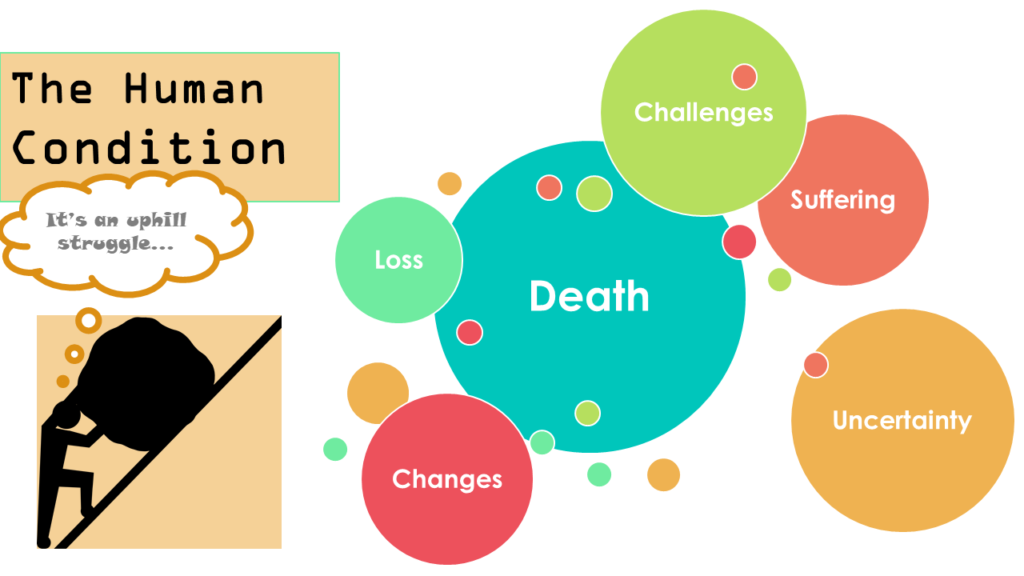
Grim Realities
- Sooner or later, I will die.
- If I live long enough, there will surely be challenges, setbacks, and losses.
- Those I love are subject to these same terms and vulnerability.
- Nothing anyone can do can change these basic terms of existence.
This is the human condition.
Here is just a sampling of the kind of thing I’m talking about:
1. Challenges everyone has to face
In addition to the inherent conditions of existence, there is a boatload of expected stuff that no one else can do for me. Included in this are developmental mile markers, established for the culture I live in, as indicators of good and responsible living. Achieving these mile markers invariably requires some level of mastery on my part — both internal and environmental.
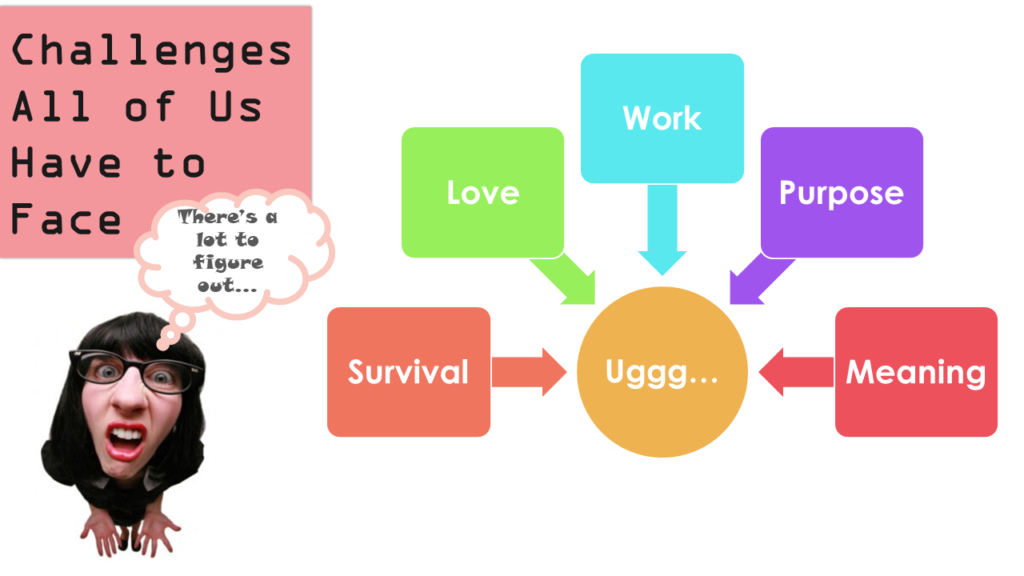
No matter how much others want to help me, in the end, it is up to me. I have to figure out, on my own, how to get the mind and body I was born with to comport with some accepted variant of the cultural ideal. If I fall short, then I fail to meet the cultural standard for full membership and perhaps even for full humanity. Even if I can hide my shortcomings, that doesn’t protect me from the pain. Everyone knows the standards, including me. I still know I’m failing even if you don’t.
2. Human needs that we all have
On some level, I’m aware that my most basic survival needs can’t really be protected. Disaster happens, both environmentally and socially. It’s the stuff that newspapers and bestsellers are full of. This awareness is hanging over me all the time. Even if I don’t experience this kind of tragedy directly, social learning ensures that I register what happens to others when tragedy strikes them.
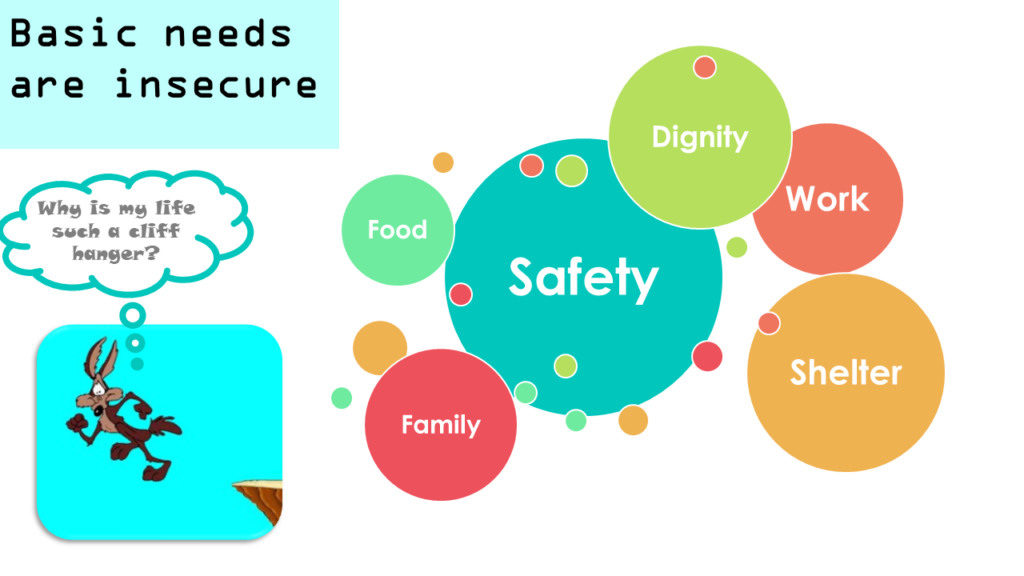
3. Painful facts about society
I’m not saying everything is bad out there. But it’s clearly not all good either. Below are just a few examples of stuff that’s on my radar. Some of it I live with daily, other things affect people I know and love. Still other things I watch from a comfortable distance — grateful, for now, that it isn’t happening to anyone I know…
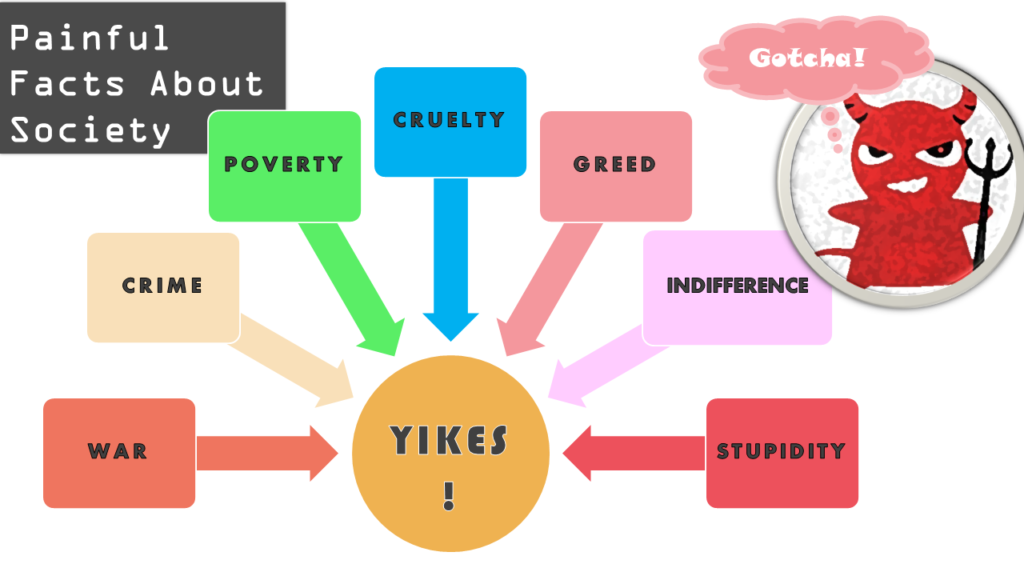
4. Questions no expert can answer
On top of all this, here comes the real kicker: No one actually has ‘the answers.’
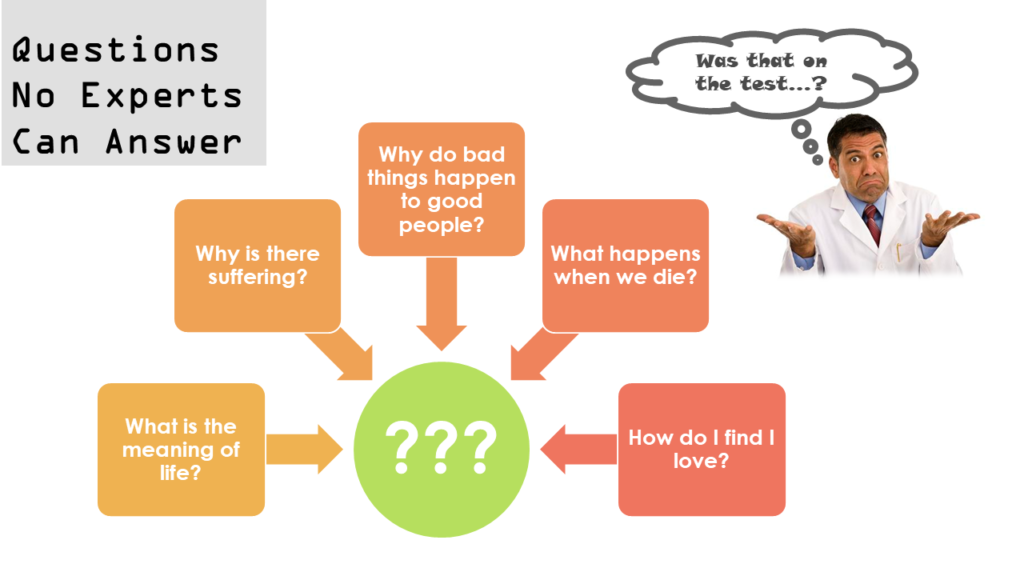
Yeah, there are a lot of theories and philosophies. There is a lot of practical, social, and spiritual wisdom. Clearly, some approaches hold more promise than others. At the same time, on a concrete, measurable, scientific level, no one really knows. As a whole, for the human race, we still have more questions than answers about the stuff that really matters.
A Matter of When, Not If
When I think about it, that’s quite a list. And this is just the “normal” stress that everyone has to deal with. No childhood trauma, natural disasters, freak accidents, or untimely misfortunes.
The point is, there’s a lot to figure out. I am born into a world with few if any certainties. There is a lot going on — mentally, physically, socially, environmentally, existentially — that I have to reckon with. There are a lot of ways to get lost or trip up.
As a result, the probability is high that at some point I am going to get stuck. Somehow, some way, I am going to meet my match in life. A particular challenge is going to lodge itself squarely into the heart of my vulnerability and stop me cold. I will fail to achieve something important to me, or I will lose something or someone I feel like I can’t live without. The more I care, the more vulnerable I am. But, in the end, it’s more likely a matter of when, not if.
The Predictable Progression of Distress
To appreciate what happens next, it helps a lot to understand the Defense Cascade. I wrote about this extensively in a piece called “Traumatic Immobility: Depression as a Stress Response.” For the purposes of today’s discussion, the essentials are this:
The Defense Cascade is a survival framework that evolutionary researchers are exploring as an explanation for extreme states that many people experience. It outlines the progression of defensive strategies that human beings in distress tend to draw on as levels of threat and overwhelm increase (Shauer & Elbert, 2010). Most people have heard about these defenses and think of them in terms of Fight/ Flight/Freeze. But trauma researchers are now developing a more sophisticated model, called the Defense Cascade (graphic below).
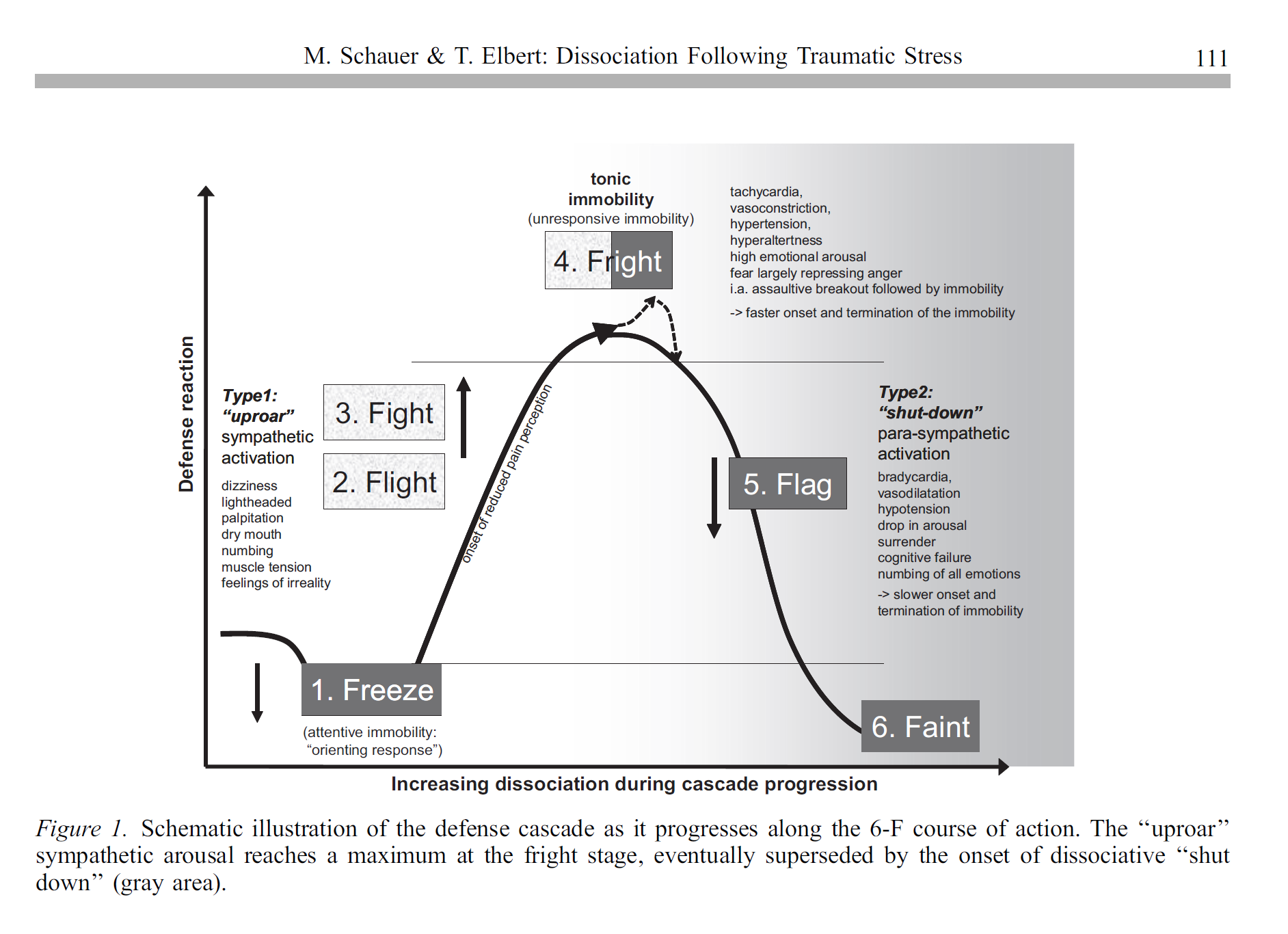
To explain how these above defenses map onto suicide, I’m going to make my own chart:
There are three basic levels:
Level 1
A simple way to understand how stress affects me is like a car. Like putting my foot on the Gas Pedal, stress triggers the sympathetic system (Action Central), which responds by rapidly delivering power to the movement centers of my body (muscles, arms, legs). This allows me to amp up quickly, cover a lot of territory, and exert control over my environment in ways that I think will serve my interests.
![Stress gets me fast energy (Action central- speed power control) [image of lightning and speeding car/ gas brake]](https://www.madinamerica.com/wp-content/uploads/2019/10/stress-hijacks-wellbeing-e1575228790626-1024x230.png)
This is what happens in Level 1. Essentially, I’m surprised, afraid, or excited, and the Gas turns on. After a brief pause to assess options (Attend/ Freeze), the active defenses (Fight/ Flight) kick into gear. At manageable levels of stress, the active defenses are largely adaptive. I notice an issue, examine my options, dodge what I can, face what I have to. Eventually, I escape or win.
HA!! Problem solved. Another notch in the belt.
But what if I’m in over my head? I’ve run my fastest, fought my hardest, but still can’t escape. I’m out of ideas, energy, and options. Nothing I know how to do is working. I have no idea how I got here and not a clue how to fix it.
Level 2
If the active defenses fail me, I proceed to Level 2 (Fright). This is a transitional stage that can go either way.
In these desperate circumstances, my body resorts to a desperate ploy. It slams on the Brake while the Gas is still blaring. This drops my heart rate and blood pressure to the floor and freezes me in my tracks. This “Fright” response buys me time when I’ve already played my best hand, and I don’t know what to do next.
The cost to me mentally and physically, however, is enormous. Because I’m scared, the Gas Pedal keeps revving my muscles full bore. But because of the Brake, I feel totally stuck. No matter how much I want to, I can’t get myself going. Every little movement takes tremendous effort.
The effect is torturous. I literally want to jump out of my skin. But I’m trapped in discomfort, fully aware, unable to move — with nothing to do but watch myself burn myself out working against myself.
However counter-productive this seems, it serves an important survival function. The Brake helps me stay put for safety purposes, even when I’m raring to go. To pick up on my car analogy, the Brake is what keeps me from blowing through a stoplight that I urgently wish wasn’t red.
If I were a rabbit in the wild, Fright might save my life. It’s basically the play-dead response that convinces the fox to put me down and go get a drink of water before making a meal of me. The moment the fox is out of sight, the Brake lifts. I Gas it out of there full bore back to my hole.
If I live in a socially responsive, community-oriented world, Fright has major advantages too. Instead of running around wreaking havoc in a terrified, agitated state, Fright basically holds me harmless when I’m out of my league. My people find me, notice something is wrong, go to get help. They care about me enough to listen to what is wrong. It’s hard to communicate at first and comes out pretty jumbled. But they stay with me and eventually we make sense of the threat together. We all learn something as a community about scary stuff we could be up against. Then everyone puts their heads together. We have the best of our collective knowledge at our disposal. We all learn from this and from each other. This raises everyone’s understanding and awareness and helps me to find a way out too.
In the process, we all get the lovely hormonal benefits of the Tend and Befriend response. 4 Dopamine boosts our motivation and sense of purpose as we work together toward a shared goal. 5 Oxytocin builds our sense of connection and belonging. It strengthens the bonds between us as we walk each other to safety. 6
Sadly, these days, that is probably not what happens. More likely, I am siloed off to treatment, where I am given antidepressant drugs and a class on coping skills — and then sent back to fight the same old battle I was losing before.
If that happens, there’s a good chance I get worse instead of better. That only stands to reason since my real problem (troubling real-life circumstances/ “stress”) is not being addressed. Plus, energy and resources are being siphoned off to deal with a new problem (“mental illness”) that I don’t actually have.
This explains why for me, all too often, seeking mental health treatment is counterproductive. I come away with fewer resources, not more, to deal with the real-life issues that I went (or was sent) to get professional “help” with. Tragically, if I’m already at Level 2 when this happens, I don’t have any energy or resources to spare. The added weight of “treatment” pulls me under instead of pulling me out.
So I proceed to Level 3.
Level 3
At Level 3 (Flag/Faint), it’s really clear I’m going to lose. I’m out of energy and options. There’s nothing left to do but give up. In Flag, I’m still aware enough to make a conscious surrender. It’s like sitting in my car with the engine running, waiting for the traffic cop to decide my fate. Faint is the literal loss of consciousness. Either I ran out of Gas or someone switched off the ignition.
The lesson from Flag and Faint is that the stress response is tremendously powerful. At extreme levels of stress, people can literally lose consciousness because their brains can’t get enough energy to function.
The Giant Sucking Sound
Chronic stress adds insult to injury. The experience, for me, is like a giant sucking sound. It actually feels like my life energy is hemorrhaging — as if there’s a hole in my being that is being extracted by some nefarious cosmic force.
It took me a long time to realize how close to true this actually is. Stress puts me in a continual high idle and makes it hard to turn that off. 7 From a survival standpoint, there’s a good reason for this. If I’m in the wild or at war with the Huns, I don’t want to let down my guard until I know the danger has passed.
The problem with the Gas Pedal system, however, is that it is only optimal for life-and-death physical challenges that can be expected to be over in about 30 to 60 minutes. After that, my body starts to break down (Sapolsky, 2004, pp. 83-86). You can begin to imagine the toll this takes when a major life problem has no fast or clear resolution.
![Stress hijacks wellbeing Stress gets me fast energy (Action central- speed power control) [image of lightning and speeding car/ gas brake] Well-being gets put on hold (Ground of Being- sleep, digestion, detox, immunity, healing, growth, awareness)](https://www.madinamerica.com/wp-content/uploads/2019/10/stress-hijacks-wellbeing-1024x576.png)
To really drive this point home, I need to paint the picture in full relief. My Gas Pedal system basically runs on borrowed energy. Like an evil banker, it withdraws massive amounts of energy from the shared pool that benefits my whole body and selectively diverts it to a privileged few. Effectively, it shuts down appetite and digestion, detoxification, immune functioning, and my basic capacity to rest, repair, and replenish myself. It revs up my muscles, putting them on continual hair-trigger alert, making me edgy, tense, and constitutionally incapable of feeling comfortable in my own skin. It rivets my attention on the stuff that’s scaring me, rendering me unable to focus on anything else. It leaves the part of my brain (pre-frontal cortex) that is capable of rational, creative, collaborative thinking totally under-resourced. That puts me at the mercy of habitual patterns (like addiction) and impulsive reactions (like hiding, running, or fighting). The game it plays — thanks to the effects of hormones like adrenalin — is all about power and control. Zero-sum, all-none. Winners, losers. My neck or yours.
It’s the perfect storm, really. With higher-order thinking almost totally offline, I’m pushed relentlessly for resolution. Somewhere deep inside me, the message is unmistakably clear:
Something is urgently wrong. Someone or something is going to go down. Quite possibly it will be me. Go, go, go, go.
This raises a really important question. If digestion is off (among other things), how does the Gas Pedal system keep going for years on end? Where does the energy come from?
Basically, two places:
- Brief dips in stress, where digestion kicks in and I wolf down copious quantities of calories. Most likely, they come from sugar and comfort foods that are nutritionally poor but help me keep going, physically or emotionally.
- By breaking down my own tissues and using them for fuel. 8 9 10
In other words, the Gas Pedal system is a cannibal. The reason I feel like I’m being stalked and preyed upon is because I am.
The Gas Pedal system is sucking the life out of me in order to fuel itself.
It is literally eating me alive from the inside out.
As you might imagine, the physical, mental, and moral depletion that results from trying to operate this way long-term can make it all but impossible to function. I miss things, lose time, or sleep 18 hours at a stretch. I start to boil water, forget about it, come back to a pot in flames. It is nearly impossible to concentrate or track reality, so I basically give up trying. There are months on end of just sitting around, praying that God will fix or kill me.
Coming Full Circle
If nothing changes, nothing changes. Absent active, effective intervention targeted to reversing stress, I tend to get stuck here. Under the influence of the Gas Pedal system, my physical and mental functioning progressively deteriorate. Bodily maintenance, repairs, and higher-order thinking stay mostly offline. As time goes on, mistakes are made, opportunities are missed, and resources diminish accordingly.
Consequently, the same level of effort gets me worse and worse returns. Yet trying harder just keeps burning me out and wearing me down even more. Rinse, repeat. Rinse, repeat. Rinse, repeat. It really is a hopeless cycle once I find myself stuck there.
Eventually, I can’t think my way out of a paper bag. My misery feels all-encompassing. Death is the only escape I can imagine.
This basically puts me back in the Sisyphus Cycle that I outlined at the beginning:
![The Sisyphus Cycle I’m scared, overwhelmed, alone Defenses amp up Brain shuts down or goes into overdrive I do what I know how to do It doesn’t work Resources diminish Desperation escalates I try to get help It doesn’t work … or feel like me … or fit my lifestyle … or my budget Rinse, repeat… until I lose my shit or toss in the towel [Graphic: Guy pushing boulder up a hill talking to self, saying “I’m so tired of this...” Retrieved from http://4.bp.blogspot.com/-Yb1qHHYlqYo/T2eYHgywpcI/AAAAAAAAAFk/Ld8ZI6ByPb0/w1200-h630-p-k-no-nu/la+cultura+del+esfuerzo.jpg]](https://www.madinamerica.com/wp-content/uploads/2019/10/sisyphus-cycle051719-1024x576.png)
The Deadly Add-On Stress
For me, the mainstream insistence that life is easy (or would be if I were doing it right) is a deadly add-on stress. Due to mainstream denial, I don’t just feel overwhelmed. I feel crazy. Disconnected. Totally alone.
If I’m the deep and thoughtful type, who cares about being authentic and about authentic connection with others, the mainstream denial pretty much signs my death warrant. To all appearances, the things I’m dying to talk about make others acutely uncomfortable. No one else seems to value, or even acknowledge, the life issues that matter to me most and make my heart sing. On the contrary, the responses I get make me feel like a huge downer and social burden.
As a result, we have nothing in common to keep me here. The thing I care about most in life — honest human connection — is neither valued nor acknowledged by my relevant social world. Gradually, painfully, the realization dawns on me:
- There is nothing I share with others that matters deeply to both of us.
- There is no way I can make your life significantly better and still be me.
- There is no way you can make my life significantly better and still be you.
It’s not too big a leap from here to utter futility. Next thing you know, I’ve climbed the last rung on the Sisyphus ladder and bought a rope to hang from.
[Don’t worry, I’m not going to leave you hanging. There’s three more installments in this series. Before it’s over, I hope we’ll be using that same noose to toss each other an enduring line. If you can’t afford to sit around waiting, there’s a growing community of us who are trying to figure out how to support each other to navigate this territory with dignity, conscience and absolutely no coercion. We hold telephone and online groups that are free and accessible, literally, from around the world. You can find out more here.]

![THE DEFENSE CASCADE Progression of Distress: 1,2,3. FREEZE FLIGHT FIGHT Anxiety – GO GO GO Burn energy attending, running or resisting Rest, repairs & learning deferred 4. FRIGHT (TRAUMATIC IMMOBILITY) Depression - stalled, stuck Foot on both gas & brake Systems work against each other & wear me out 5,6. FLAG, FAINT Dissociation - blurred reality Too worn down to fully attend to outside world Personal & external content overlap [Graphic: Guy pushing boulder up a hill talking to self, saying “Is it just me or is this rock getting heavier…?.” Retrieved from http://4.bp.blogspot.com/-Yb1qHHYlqYo/T2eYHgywpcI/AAAAAAAAAFk/Ld8ZI6ByPb0/w1200-h630-p-k-no-nu/la+cultura+del+esfuerzo.jpg]](https://www.madinamerica.com/wp-content/uploads/2019/06/defense-cascade-plus-dxs-1024x576.png)














Evolutionary psychiatry brought eugenics to life with German psychiatrists murdering around 400,000 people. We have begun down this road again.
When we talk about suicide, there is the not so small matter of AKATHISIA/TOXIC PSYCHOSIS… an epidemic of death and destruction caused by doctors and pharma.
If you act vulnerable in a psych ‘hospital’ the psychiatrists and nurses will not just allow you to be abused they will encourage it, while the regulatory organisation that is suppose to over see ‘care quailty’ turns a blind eye to all this and only acts when some journalist goes in as an undercover carer, films the abuse and a tiny iceberg tip of the normalised abuse is shown on the BBC and else where. A few ‘carers’ lose their jobs and may end up in court. And then it just continues.
Will you be writing about this ?
Report comment
“Before I go further here, however, I need to deal with a sensitive issue. In the process of writing this piece, I became acutely aware of an unpleasant social fact. In reality, all stress isn’t equal. Moreover, some stressors aren’t “normal.” Painfully, there are social misuses and abuses of power that create life-threatening levels of trauma for far too many of us in the modern world. The next piece in this series will address these “unnatural” stressors. Discussed there will be the devastating kinds of social dynamics where someone puts their thumb on the scale in massively predatory ways. It is there, perhaps above all else, that absent active intervention by others of conscience, the rational instinct to suicide becomes abundantly, tragically clear.”
I am enjoying what you have written so far Sarah, and look forward to what you have written above about your next piece. I think back over what was done to me my the “predatory” Operations Manager at the hospital that allowed their Community Nurse to torture and kidnap me (call it something else if you like but the truth is thats exactly what it was, and hence the reason for pushing me to attempt suicide. The false claim that they can make me into a “patient” after the fact and they are no longer crimes just doesn’t work, so next stop an ‘unintended negative outcome’ or more commonly known in the criminal world as a ‘hotshot’). The ‘cover up’ involving the distribution of fraudulent documents and attempting to have me murdered in an Emergency Dept before police noticed that they had been ‘duped’ into assisting with a kidnapping and torture only being foiled by the active intervention of my wifes best friends husband who “doesn’t have the stomach” for convenience killings by young impressionable doctors. Best he is put in someones pocket for later use and promoted to the head of the Doctors Union rather than doing prison time with other killers.
The really poor cover up has left me rather stressed though, and I wonder now if it isn’t best that my government does simply kill anyone they torture because my life really hasn’t been worth living since the day I was ‘spiked’ with benzos and kidnapped by organised criminals from a hospital who have figured out if they lie to police and say someone is a “mental patient” police will treat them rather badly and assist with their crimes. Given that they are ignoring the Convention against the use of Torture, why not refoul and murder anyone who complains about being tortured and has the proof? Try making a complaint to police when your a “mental patient” and your self appointed doctor (who you have never met) gets asked if your allowed to make complaint, not dissimilar to police asking the rapist if your allowed to make complaint about being raped,. I’m not a fan of predetermined outcomes and preferential negligence.
And still I receive letters from Federal Members of Parliament misdirecting my ‘complaint’ to bodies they know will be ineffective in dealing with what are criminal offences. Is it any wonder these child abusers within the Church got away with their crimes for 30 – 40 years? This practice of misdirecting criminal matters is disgraceful, though I assume the M.P. who is doing this isn’t loosing any sleep over the matter, and he gets to see his family unlike me who hasn’t seen my daughter or grandchildren for 8 years as a result of the need t cover up torture and kidnapping authorised by the State (Chief Psychiatrist/Minister for Mental Health) Documents available if you wish to view the proof. Or take the word of known slanderers and frauds and ignore everything i’m saying because they will “do” your families too, or so I’ve been told by one witness who dared to listen to me (a psychologist no less).
Imagine his position being asked by Police to find out “who else has got the documents” and knowing why they wanted them back, and what had been done to me in attempting to cover up the torture and kidnapping. He stated he couldn’t see me anymore because he was afraid for his family. Similar situation for the Social Worker who came to police with me and the documents they thought they had retrieved and observed me being threatened with arrest for having the proof I had been ‘spiked’ with benzodiazepines before 7 hours of interrogation. Big tough man who claimed to be fighting for the rights of the Mentally Ill wets his pants and runs away. Glad I wasn’t in the trenches with this coward fighting for the rights being written away by the Chief Psychiatrist with a pen. Paid for in blood, lost as a result of negligence. Rights without remedy.
Report comment
Well said, Streetphotobeing! Far too many of our people are being traumatized and terrorized in iatrogenic settings and by iatrogenic services, procedures and pharmaceuticals. My own experience is comparatively mild, but I have heard and believe the horrors reported by so many others. I wrote quite a bit about this in my earlier work in 2016-2017 in a blog called Peerly Human, https://peerlyhuman.blogspot.com/. A later piece in this series (devoted to iatrogenic suicide) will touch on this, though definitely not adequately as the harms truly are so vast, pervasive and unaddressed. It’s a painful issue of our times, as you duly note. The king truly is wearing no clothes, but woe to those who voice it–especially in institutional settings where far too often release depends on abject compliance (or insurance running out).
Report comment
This young women is begining to understand what is happening now in the UK:
https://youtu.be/hX01cPYXI9Q?t=567
“Often the blame is placed at the feet of there being a lack of proper training, a lot of vacancies, under trained staff. What I just saw… that wasn’t poor training, it wasn’t under staffing, it was absolutely total and utter cruelty and a totally and utter house of hell.”
“And I think what shocked me the most about it, what I don’t really understand and what I very often find with people who’ve committed crime, which is what they did, what they did was criminal, there is no two ways about it… they totally mistreated and abused these people. Umm what I never really understand is that, one person, I could understand how one person could infiltrate a group of good people and can be slyly doing things that are awful. What I don’t understand is how you get so many together. I can’t imagine being in anybodies company who did something like that and not telling them exactly what I thought. And even if I felt threatened by them I would most certainly report it.”
She has yet to fully grasp that psychiatrists control all this.
Report comment
It is not lack of training, it is the ability to dehumanize the victims that leads to this kind of mass unethical behavior. It works very much similar to a gang rape. What is the likelihood that ALL members of a certain sports team are rapists? Simply not possible. So how does an entire team participate in such an atrocity, as has been documented numerous times? It happens when the victim is sufficiently dehumanized that other group members can treat the victim is a non-human so that normal rules of ethics don’t apply in this situation. Same thing with group torture like Abu Ghraib. And it is psychiatry’s own DSM labeling process that makes this mass dehumanization possible. Those people providing “treatment” have been “trained” to see the “patients” as a subgroup who don’t deserve the same rights as other humans. So, in fact, it is not a lack of training, but a training in the use of dehumanizing terms and beliefs that leads to this result.
Report comment
Thank you Steve
Report comment
YES and the eugenics this time round is going under the radar of the UK general public, but in full view and knowledge of the Care Quality Commission… The organisation that is suppose to be the watch dog. There are about a 1000 members – no doubt all psychiatrists/psycologists – of the Evolutionary Psychiatry special interest group. We need to focus there. People outside of all this will think this is crazy unbelievable. It’s not, this is happening right now up and down the UK. The CQC whistleblowers have been trashed. Everything is in place for more destruction. People who die in a psych hospital do not get an independent investigation and at the executive level of these ‘Health’ Trusts they just sign off what ever the psychiatrists say and know they can get away with it because CQC does nothing.
Report comment
“10,000 more people than expected died at the beginning of the year in the UK – and no one really knows why”
https://www.independent.co.uk/voices/england-wales-mortality-health-medicine-nhs-death-rate-a8256931.html
“A huge number of measures of the nation’s health have deteriorated, including a very rapid and largely unreported recent increase in the numbers of deaths among mental health patients in care in England and Wales. ”
NO, WE KNOW WHY!
Report comment
Zimbardos Lucifer Effect
“moral transformation as an outcome of the interplay between individual disposition, situation, and systems of power.”
No doubt this was deliberately manipulated in the case of Abu Ghraib, and i’d suggest also in the ‘introduction’ of staff to the locked wards where one needs to have the stomach for the work that is involved.
Report comment
Thanks Sarah, You’re always brilliant. I’ll have to analyse this article for nuggests of wisdom!
Report comment
Sarah!
You’ve described it all *perfectly*.
“For me, the mainstream insistence that life is easy (or would be if I were doing it right) is a deadly add-on stress. Due to mainstream denial, I don’t just feel overwhelmed. I feel crazy. Disconnected. Totally alone.”
The stress of the holiday, the condition of ‘stress sensitivity’ from my d/cing benzos, and the news that the Trump administration is gunning for disability recipients (which will leave me homeless ) and the general tone of our ‘society’ … they want me dead. I am a burden to *everyone*. I wish i wish I could score some morphine or nembutal — just to have on hand when the time is right. The clock is ticking…and I am so so very tired.
https://btlonline.org/trump-drive-to-cut-social-security-disability-benefits-will-kill-thousands/
Report comment
Hi furies,
I like it when people can say how they feel, and know that no one
will judge them or lock them up.
Many are afraid to say how they feel, for fear of depressing someone, or getting them angry, or having good old psychiatry save them in the loving ways that they practice..
I know that you are not a burden, but I do know what that feels like. Society is wonderful at making people feel this way.
Report comment
Hi Sarah, thank you for the great writing.
I wonder about cameras in psych wards.
Patients should be allowed to film their experiences, or experiences of other patients.
I mean if nothing wrong is done, then why not? Why should patients not be allowed to have a family member, or advocate with them with a camera? faces could be blurred.
It is not as if it is a surgery where utmost cleanliness is required, it is not an ICU.
Family is allowed into ER and hospital rooms, why not in psych where it really matters?
I guess too much to hide. It would be horrible for the staff to use self constraint, and I bet soon people would quit since they could not make use of their sadistic desires.
I believe that once staff get used to the forcing, it could become addictive, kind of like running.
I know some teachers who love control, will pick a certain kid, just to let a little anger escape on their target.
Cops do the same thing, and security guards.
Report comment
The long and the short of it is that I no longer see myself as “mentally ill.”
That’s a start, but in the end it doesn’t matter how you “see” yourself: “mental illness” is an impossibility.
I think you’re trying to overthink this. You talk about the “human condition,” but the circumstances which lead people to suicide are largely created by capitalism, i.e. the subjection of humans to conditions which are inimical to life. I’m not saying your diagrams, etc. are inaccurate, and some might find them helpful. But we need to recognize that psychiatry is a tool of repression, and nothing more. What we need to do is redirect the energy we might otherwise put into self-destructive pursuits against the system which keeps us ALL down. People learn that when they unite to fight their collective enemies there is a sense of empowerment which ensues. We need to stop being so introspective as to ignore the reality that we are ALL expected to negate our needs in subservience to a system which exists to materially enrich a tiny percentage of the population at the expense of everyone else. That some people are less capable of resisting this does not reflect an individual “disorder,” simply that some are less resilient. And if it were recognized that we ALL are up against the same system, and the same people, people would be far less prone to see their circumstances as purely personal, and their only solution suicide, as opposed to collectively fighting to erase the conditions which drive us to such desperate measures.
Report comment
Thanks Sarah for another good article.
As humans we all deal with two common denominators you noted:
“The normal stressors that everyone has to deal with”.
“The normal stress response that everyone is born with”.
I remember thinking how ridiculous the popular song/slogan “Don’t worry, Be happy” was 30 years ago. Can there be anyone walking around these days without at least a moderate degree of stress/anxiety about the planet, natural disasters, wars, poverty, crime and overwhelming corruption – especially the insidious corruption carried out by so-called health care professionals.
Report comment
So true Rosalee,
Although I know a ton of people that don’t get worried in the slightest about any of that. I live with one.
What the mental health industry did is name the variation in humans a mental illness.
Even if they can point to this variation on scans or genetics, (which would actually some non believers or doubters) the question still remains as to why they would call it an “illness” and why they give this “illness” drugs that maim.
The one thing that always points to the falsity, is the mistreatment and infiltration into every system, that “mental illness” receives. And how they basically use traits as “illness” and act as if those traits lead to overall incompetency.
There is NO other “illness” that receives the wrath and mistreatment, the victimizing, and the accusations.
Report comment
Right you are, Sam! Genetic diversity is the core of species survival. Even if it’s proven that genetics, for instance, affect activity levels and that some “ADHD” people have a genetic difference means NOTHING about whether or not “ADHD” is a disease state! Men and women have VASTLY different genetics in the X/Y genes, heck, men are MISSING a whole bunch of DNA that women have, and men certainly act differently overall than women. Are we prepared to call having male sex genes a “disease” based on that fact alone? (Testosterone poisoning, anyone?)
Report comment
“ADHD” is culturally defined, and based on what others have determined is “appropriate” to focus one’s attention on. Such as schoolwork.
Report comment
Quite so. And of course, once we start “socially defining” “disorders,” anything and anyone can be targeted.
Report comment
“…..The long and the short of it is that I no longer see myself as “mentally ill.” I also no longer need to jump out of my skin from chronic discomfort, regret for my past and fear for my future. What I think I’m up against is the human condition. The stress response is part of that. Like all things human, the stress response is mixed. In the right circumstances, it is a life-saving, life-enriching gift. In the wrong ones, it is a curse that can make my life a living hell….”
I’m looking forward to the next instalments!
Report comment
“My body doesn’t speak English. She speaks feelings.”
I love this perfect phrase. The mainstream drugs, ignores, dismisses, judges, and rationalizes feelings, rather than to honor, respect, listen, learn, and be guided by them. Indeed, that is stressful!
If humanity on the whole were to learn the language of feelings, I believe we’d understand things better, starting with ourselves, because we’d be listening to our bodies over “social norms.” That feels like synchronicity to me, and alignment–not with social expectations, but more so, with who we really are, our true nature. Our feelings tell us who we are, they guide us like an inner light. To cut off from feelings is like being in the dark.
I believe there is far less stress when we are aligned with our true nature because we are not split between our own desires and preferences vs. what society expects. Social expectations impose on individuals (oppression), they do not support our nature (freedom).
When we give ourselves permission to be authentic based on how we truly feel at any given moment, then we, in turn, give others this permission, too, by example. That is the emotional, creative, and spiritual freedom which I believe we all crave. Certainly anything less than that is stressful because we simply are not feeling free to be ourselves, and that is maddening. Can we attain this level of freedom in life, and have our bodies feel good about it and be in agreement with it? I would think one would lead to the other, but it seems we have work to do here.
Always inspiring and so thought provoking, Sarah, I look forward to what’s coming next.
Report comment